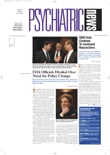Q. I am a solo psychiatrist with a parttime practice—about 10 hours a week. I use an answering service that patients can use to contact me after hours. This arrangement is not cost-effective, and I am considering alternatives. Since I see about only 40 patients and they're very stable, would I be providing sufficient coverage if I directed patients to leave a message on my office answering machine and I checked the machine periodically?
A. Such an arrangement would almost certainly not be considered sufficient. Parttime practice does not mean part-time patients. Even stable patients can have unanticipated emergencies, and the bottom line is that you must either be available to meet your patients' needs or arrange for them to have access to the care they might need in your absence.
Various guidelines about this issue are instructive. The following is taken from Section 1-AA of APA's Opinions of the Ethics Committee on the Principles of Medical Ethics With Annotations Especially Applicable to Psychiatry (2001 Edition):
Question A: One of our members is concerned that psychiatrists in his area do not routinely check in with their answering machines after hours, leave no number where they may be reached, or leave a message for patients to contact the local emergency room in case of emergency. Is this member's concern about the ethics of these psychiatrists warranted?
Answer: Yes. Ethical psychiatrists are obliged to render competent care to their patients. That competent care would include either being available for emergencies at all times or making appropriate arrangements. Certainly, a message telling patients to call an emergency room is not adequate coverage. Even in rather stable practices, including analytic practices with relatively stable patients, emergencies do arise. Care must be taken that, if and when such emergencies do arise, the patient is not abandoned (September 1993).
In addition, some state medical boards have developed positions about coverage of a practice. For example, both the North Carolina and Colorado boards maintain that patients must be able to secure necessary care at all times whether or not the treating physician is available personally.
Psychiatrists should check with their state licensing bodies in order to determine what is considered acceptable after-hours coverage in their state and whether there are specific state-licensing rules, policies, or opinions about this issue.
Q. I will be attending APA's 2005 annual meeting in Atlanta in May. Will the Psychiatrists' Program have customer service staff at the meeting and will Program staff be presenting at any risk management or insurance sessions?
A. Yes. The Psychiatrists' Program will be located at booth #1210 in the Exhibit Hall in the Georgia World Congress Center. Risk managers and insurance underwriting specialists will be present to provide individualized insurance information and risk management advice for psychiatrists.
If you're a participant of the Psychiatrists' Program, be sure to visit our booth and receive complimentary copies of our most requested materials as our thanks for your participation. You'll receive a “For Participants Only” package and a valuable customer resource guide.
Program staff will also present at the following sessions:
•
“Risk Management Issues in Psychiatric Practice”: Monday, May 23, 9 a.m.-10:30 a.m., Room B402, Level 4, Georgia World Congress Center
•
“How to Launch a Successful Private Practice, Part One”: Tuesday, May 24, 9 a.m.-10:30 a.m., Room B308, Level 3, Georgia World Congress Center
•
“Contemporary Malpractice Liability: A Practical Guide”: Wednesday, May 25, 8 a.m.-noon, Gwinnett Room, Second Floor, Hilton
During the meeting, please be sure to check the conference schedule for any lastminute changes to times or locations. More information appears on the Program's Web site.
Q. I am a participant in the Psychiatrists' Program and recently received a CD-ROM that included a risk management manual. Is this resource also available online?
A. Yes. As a benefit of the Psychiatrists' Program, all participants receive a CD-ROM copy of the newly released resource “Risk Management Resource for Psychiatric Practice: A Comprehensive Manual for Psychiatrists and Mental Health Professionals.” This resource can also be found online on the Program's Web site at<www.psychprogram.com> in the “For Participants Only” section. Developed by the Program's risk management department, this resource has been designed to be the most extensive psychiatric risk management resource available. The 350-plus-page manual includes discussion on topics such as the risk management process and associated legal concepts, creation of the psychiatrist-patient relationship, informed consent to treatment process, psychiatric records, and protecting and disclosing information.
This column is provided by PRMS, manager of the Psychiatrists' Program, for the benefit of members. More information about the Program is available by visiting its Web site at<www.psychprogram.com>; calling (800) 245-3333, ext. 389; or sending an e-mail to [email protected].▪
